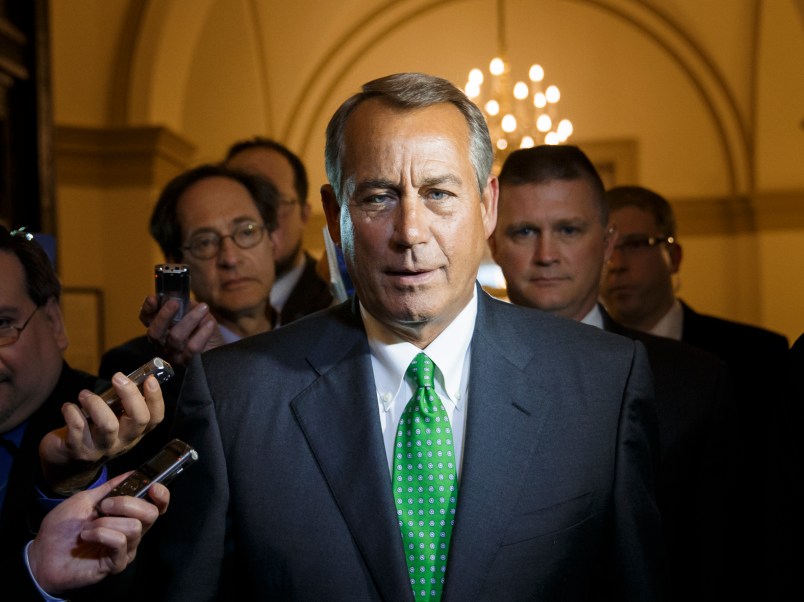The morning after President Barack Obama first called for raising the minimum wage, House Speaker John Boehner swiftly shot it down. It was the president’s first State of the Union speech after winning re-election.
The Ohio Republican isn’t personally known to be a right-wing ideologue, but he has a special enmity for the federal minimum wage that dates back many years. As a congressman he has voted against successful wage hikes for two decades, and as Speaker, he has proudly made himself Enemy No. 1 of the Democrats’ renewed push to lift it to $10.10 per hour.
Why? He thinks it’s a job-killer because it raises the cost of hiring, something he said he personally experienced as a former small business owner. And even if he wanted to lift the wage, his GOP conference vociferously opposes the idea and wouldn’t take kindly to him bringing up such a bill.
“I’ll commit suicide before I vote on a clean minimum-wage bill,” Boehner, then the House GOP Conference Chairman, told the conservative Weekly Standard in 1996, a quote that captures the Ohioan’s attitude toward the issue.
His stance on the wage is — and has traditionally been — to just leave it where it is. He doesn’t call for lowering it, even though lots of conservatives want to reduce or eliminate the federal wage floor entirely, because that carries the risk of appearing callous and uncaring toward the struggling working class. But he has stood against wage hikes for the last several decades.
In January 2007, Boehner voted against a Democratic bill to incrementally raise the minimum wage from the current level of $5.15 per hour to $7.25 per hour by 2009 — where it has remained since. The bill passed with unanimous Democratic support and 82 Republicans.
In August 1996, Boehner voted against raising the wage from $4.75 per hour to $5.15 per hour. The bill passed with 160 Republican votes.
Boehner recognizes the political potency of the minimum wage. In 2006, fearing a Democratic wave in the mid-term elections, Boehner supported a GOP bill to incrementally lift the minimum wage to $7.25, but with a poison pill that he knew would scuttle the bill: a big cut to the estate tax. The aim was to neutralize the wage hike as a political issue for Democrats.
Now, Boehner is aiming to keep the issue off the radar with as little drama as possible. His lack of interest in adjusting the wage in any direction implies a belief that $7.25 per hour is the optimum level, although that conviction appears to lack empirical basis. Democrats want to force the issue by bringing up a discharge petition, which means that if they secure 218 signatories in the House, the bill has to come up for a vote. But that’s unlikely to succeed.
“I’ve been deadling with the minimum wage issue for the last 28 years that I’ve been in elected office,” the Speaker said last year. “And when you raise the price of employment, guess what happens? You get less of it. At a time when Americans are still asking the question ‘Where are the jobs?’ why would we want to make it harder for small employers to hire people?”
A recent Congressional Budget Office report found that lifting the wage would boost the earnings of $16.5 million workers and cost 500,000 jobs by the second half of 2016. The White House disputes the finding that it’d harm jobs.






